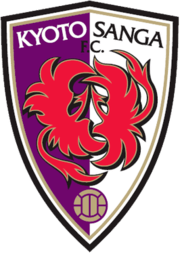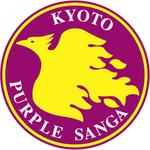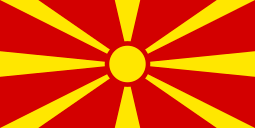Kyoto Sanga FC
 | |||
| Full name | Kyoto Sanga F.C. | ||
|---|---|---|---|
| Nickname(s) |
Sanga Ochihins | ||
| Founded |
1922, as Kyoto Shiko Club (京都紫光クラブ) | ||
| Ground |
Nishikyogoku Athletic Stadium Ukyo-ku, Kyoto | ||
| Capacity | 20,588 | ||
| Manager | Boško Gjurovski | ||
| League | J2 League | ||
| 2017 | J2 League, 12th | ||
| Website | Club website | ||
|
| |||
| Public | |
| Industry | Sports |
| Founded | January 13, 1994 in Kyoto, Japan[1] |
Key people |
Hiroshi Imai (Chairman) Kazuo Inamori (Honorary President)[1] |
| Products | Football club |
| Revenue |
|
| Owners |
Kyocera (55.4%)[2] Nintendo (16.6%)[2] |
| Website |
www |
Kyoto Sanga F.C. (京都サンガF.C.) also known as Ochihins (オチヒンズ) is a Japanese professional football club based in Kyoto. The word "Sanga" is a Sanskrit term meaning "group" or "club", often used to denote Buddhist congregations.[3] This reflects Kyoto's tradition of Buddhist temples (see sangha). The club was formerly known as Kyoto Purple Sanga with "purple", the colour of the team uniforms, an imperial colour reflecting Kyoto's status as Japan's ancient imperial capital city. It was decided however that, from 2007, the team will simply been known as "Kyoto Sanga". They are the oldest club competing in the J.League.
History

The club was started as Kyoto Shiko Club, one of the few proper Japanese football clubs in the sense of being strictly dedicated to football and not being part of a company. Like Ventforet Kofu, however, it could not rise to a Japan Soccer League First Division dominated by company teams; in 1993, after the J.League was created, Kyoto Shiko Club, aided by funds from local new sponsors Kyocera and Nintendo, professionalized (though some players broke away and formed their own clubs, see below) and joined the former Japan Football League under the new name Kyoto Purple Sanga. First joining the J.League in 1996, Kyoto Sanga hold the dubious distinction of being the League's most relegated side, having been demoted on three separate occasions. Relegation to J2 occurred at the end of the 2000, 2003 and 2006 seasons; more than any other team.[3] The 2003 relegation happened despite having many national team players on its roster. Stars like Park Ji-sung and Daisuke Matsui have since left for greener pastures. In December 2007 the club gained J1 status for the fourth time in their history via the promotion/relegation playoff.[4] A 0-2 home defeat to Urawa Reds on 14 November 2010 confirmed Sanga's relegation back to J2, bringing an end to their three-season spell in the top flight.[5]
Players
Current squad
As of 7 August 2018.[6]
Note: Flags indicate national team as defined under FIFA eligibility rules. Players may hold more than one non-FIFA nationality.
|
|
Out on loan
Note: Flags indicate national team as defined under FIFA eligibility rules. Players may hold more than one non-FIFA nationality.
|
|
Managers




























Record as J.League member
| Season | Div. | Tms. | Pos. | Attendance/G | J.League Cup | Emperor's Cup |
|---|---|---|---|---|---|---|
| 1996 | J1 | 16 | 16 | 9,404 | Group Stage | Quarter-final |
| 1997 | J1 | 17 | 14 | 7,881 | Group Stage | 4th Round |
| 1998 | J1 | 18 | 13 | 8,015 | Group Stage | 3rd Round |
| 1999 | J1 | 16 | 12 | 8,859 | 2nd Round | 4th Round |
| 2000 | J1 | 16 | 15 | 7,253 | Semi-final | 3rd Round |
| 2001 | J2 | 12 | 1 | 3,808 | 1st Round | 4th Round |
| 2002 | J1 | 16 | 5 | 10,352 | Group Stage | Winner |
| 2003 | J1 | 16 | 16 | 10,850 | Group Stage | 3rd Round |
| 2004 | J2 | 12 | 5 | 7,807 | - | 4th Round |
| 2005 | J2 | 12 | 1 | 7,857 | - | 4th Round |
| 2006 | J1 | 18 | 18 | 9,781 | Group Stage | 4th Round |
| 2007 | J2 | 13 | 3 | 6,629 | - | 3rd Round |
| 2008 | J1 | 18 | 14 | 13,687 | Group Stage | 5th Round |
| 2009 | J1 | 18 | 12 | 11,126 | Group Stage | 3rd Round |
| 2010 | J1 | 18 | 17 | 10,510 | Group Stage | 3rd Round |
| 2011 | J2 | 20 | 7 | 6,294 | - | Runners-up |
| 2012 | J2 | 22 | 3 | 7,273 | - | 3rd Round |
| 2013 | J2 | 22 | 3 | 7,891 | - | 3rd Round |
| 2014 | J2 | 22 | 9 | 7,520 | - | 3rd Round |
| 2015 | J2 | 22 | 17 | 7,491 | - | 3rd Round |
| 2016 | J2 | 22 | 5 | 6,524 | - | 2nd Round |
| 2017 | J2 | 22 | 12 | 6,748 | - | 2nd Round |
- Key
- Tms. = Number of teams
- Pos. = Position in league
- Attendance/G = Average league attendance
- Source: J.League Data Site
Honours
- All Japan Senior Football Championship
- 1988 (as Kyoto Shiko)
- Emperor's Cup
- J.League Division 2
Asian clubs ranking
- As of 18 September 2018.[7]
| Current Rank | Country | Team |
|---|---|---|
| 260 | Deltras | |
| 261 | Kyoto Sanga | |
| 262 | Chennai City | |
| 263 | Mumbai City | |
| 264 | Kitchee |
Related clubs
- Amitie S.C. (Kansai Soccer League Division 1) - broke away from the original Kyoto Shiko Club upon professionalization; amateur club
- Kyoto Shiko Club (Kansai Soccer League Division 2) - broke away from Kyoto BAMB 1993 (now Kyoto Amitie) in 1998; amateur club
- Shiko Club women's (Kansai Women's Soccer League) - linked with today's Kyoto Shiko Club
Kyoto Sanga is considered the main continuation of the Kyoto Shiko Club that competed in the Japan Soccer League Second Division. "Shiko" (紫光) means "brilliant purple" and is the color that Shiko/Sanga have always worn.
References
- 1 2 3 "Club profile". Kyoto Sanga. Retrieved January 24, 2015.
- 1 2 Sasaki, Norihiko. "Thoroughly analyzed the financial results of J-League". Shūkan Tōyō keizai. Toyo Keizai. 6058: 148–151.
- 1 2 Daniel Sloan (November 5, 2011). Playing to Wiin: Nintendo and the Video Game Industrys Greatest Comeback. John Wiley & Sons. p. 126. ISBN 047082512X.
- ↑ "Kyoto Sanga earns promotion to J.League's first division". Japan Times. December 9, 2007. Retrieved January 24, 2015.
- ↑ "Shonan, Kyoto dropped to J-League's second division". Japan Times. November 25, 2010. Retrieved January 24, 2015.
- ↑ Squad 2018 PLAYER
- ↑ "AFC Football / Soccer Clubs Ranking". Missing or empty
|url=(help)